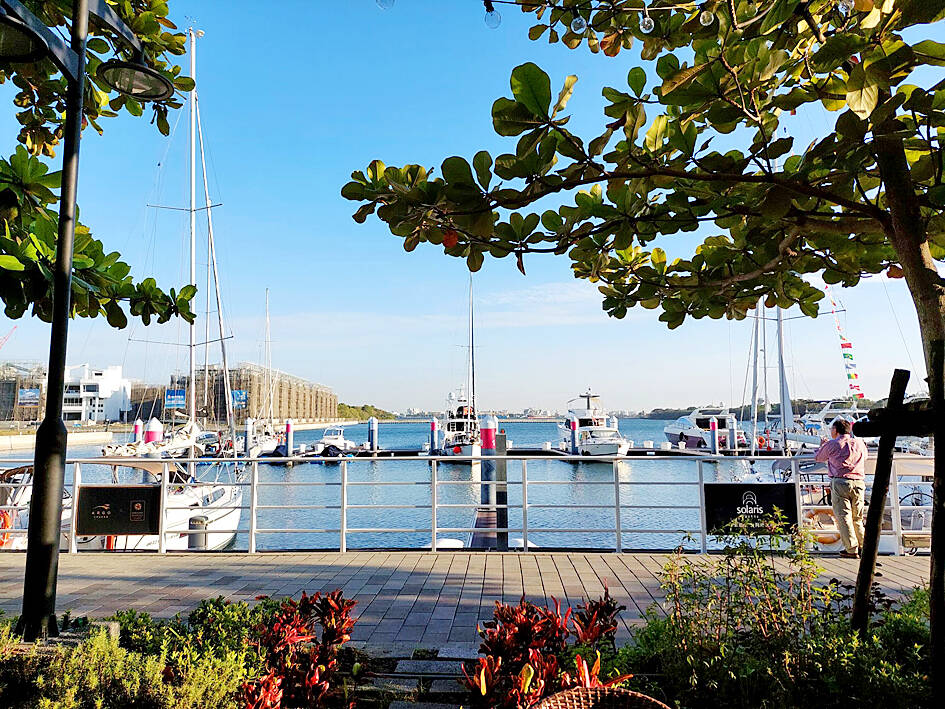A company executive is betting big on marina development in Taiwan, as the government aims to boost the number of dedicated recreational yacht berths to 1,600 from 1,138 by 2025.
Taiwan could make its dream of having thousands of sailboats and yachts make port calls in the country a reality by speeding up the construction of new marina berths, ARGO Yacht Club (亞果遊艇會) president Ho Yu-lin (侯佑霖) said.
ARGO operates three marinas, in Kaohsiung, Penghu County and Tainan’s Anping District (安平).

Photo: CNA
The 12-hectare Tainan Anping Yacht City is a members-only yacht club providing an array of amenities including restaurants and a hotel resort operated by Singapore’s Banyan Tree Group (悅榕集團), according to the company.
The Anping club was developed after the company received rights in 2017, after which 62 berths were completed. ARGO plans to increase that number to 170 in an expansion project.
Although recreational berths can be found in fishing ports throughout Taiwan, only about 200 have electricity and water charging stations for yachts and sailboats, Ho said.
Regarding the government’s “blue ocean highway” plans, Ho said that a major obstacle is the requirement for private marina operators to fund dredging work without government subsidies or loans.
Dredging consists of maintaining proper channel depth within a marina, and is essential for vessels such as yachts, ferries and private boats to navigate through the facility. Consistent dredging is necessary for safety and to keep a marina operating at maximum capacity throughout the year.
Ho is nevertheless optimistic about the potential of the blue ocean highway plan, and said that ARGO plans to expand its foothold in Taichung and Taipei.
Taiwan has many areas with adequate infrastructure for developing piers for yachts, he said.
More yacht berths that meet international standards would diversify the tourism industry and allow Taiwan better capacity to resupply boaters sailing between Northeast and Southeast Asia, Ho said.
Taiwan is pushing to expand its recreational boating sector, with plans to add six dedicated zones for yachts and sailboats, bringing the number to 24, and create about 460 berths to bring the total to 1,600, with a target date of 2025, the Maritime and Port Bureau said.

TEMPORARY TRUCE: China has made concessions to ease rare earth trade controls, among others, while Washington holds fire on a 100% tariff on all Chinese goods China is effectively suspending implementation of additional export controls on rare earth metals and terminating investigations targeting US companies in the semiconductor supply chain, the White House announced. The White House on Saturday issued a fact sheet outlining some details of the trade pact agreed to earlier in the week by US President Donald Trump and Chinese President Xi Jinping (習近平) that aimed to ease tensions between the world’s two largest economies. Under the deal, China is to issue general licenses valid for exports of rare earths, gallium, germanium, antimony and graphite “for the benefit of US end users and their suppliers

Nissan Motor Co has agreed to sell its global headquarters in Yokohama for ¥97 billion (US$630 million) to a group sponsored by Taiwanese autoparts maker Minth Group (敏實集團), as the struggling automaker seeks to shore up its financial position. The acquisition is led by a special purchase company managed by KJR Management Ltd, a Japanese real-estate unit of private equity giant KKR & Co, people familiar with the matter said. KJR said it would act as asset manager together with Mizuho Real Estate Management Co. Nissan is undergoing a broad cost-cutting campaign by eliminating jobs and shuttering plants as it grapples

Dutch chipmaker Nexperia BV’s China unit yesterday said that it had established sufficient inventories of finished goods and works-in-progress, and that its supply chain remained secure and stable after its parent halted wafer supplies. The Dutch company suspended supplies of wafers to its Chinese assembly plant a week ago, calling it “a direct consequence of the local management’s recent failure to comply with the agreed contractual payment terms,” Reuters reported on Friday last week. Its China unit called Nexperia’s suspension “unilateral” and “extremely irresponsible,” adding that the Dutch parent’s claim about contractual payment was “misleading and highly deceptive,” according to a statement

The Chinese government has issued guidance requiring new data center projects that have received any state funds to only use domestically made artificial intelligence (AI) chips, two sources familiar with the matter told Reuters. In recent weeks, Chinese regulatory authorities have ordered such data centers that are less than 30 percent complete to remove all installed foreign chips, or cancel plans to purchase them, while projects in a more advanced stage would be decided on a case-by-case basis, the sources said. The move could represent one of China’s most aggressive steps yet to eliminate foreign technology from its critical infrastructure amid a